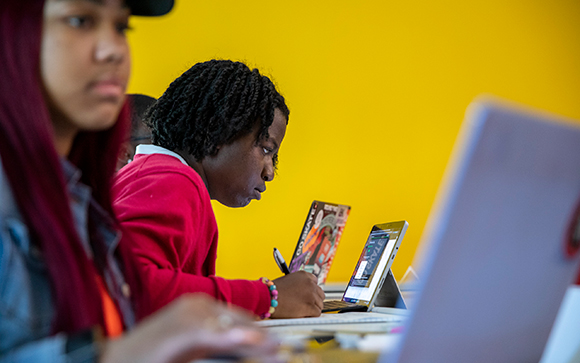Courtesy of Bowie State University
Bowie State University (BSU) in collaboration with The Maryland Center at Bowie State University, Chaminade University and TDX International, LLC (TDXi), an Alaska Native 8 (a) small business subsidiary of TDX Corporation have introduced a Phase II Research and Development (R&D) micro-internship model initiative designed to mitigate misinformation and disinformation that can negatively impact U.S. National Security and the lives of U.S. citizens. The initiative brings together an internship cohort that includes BSU, Chaminade University, University of Hawaii, Booz Allen Hamilton, and Oahu, Hawaii citizens.
Bowie State’s Influence Operations National Innovation Center (BIONIC) was introduced last year as a nonpartisan, national public-private partnership consortium consisting of only Academia and small businesses to use machine learning/Artificial Intelligence (AI) and other leading-edge technologies/innovation for countering malign influence (CMI) that is intended to be detrimental to the U.S.
During the initial micro-internship model pilot in April 2023, Dr. Helen Turner of Chaminade University (Oahu, HI) introduced a new approach that can benefit both students and private citizens for future careers in fields that will enhance advances to combat malign influence in our new digital world. Turner is Principal Investigator of an NSF INCLUDES Alliance supporting data science in the Indo-Pacific region, and an Air Force Office of Scientific Research program supporting data science workforce development.
“Our NSF and Air Force-funded programs are all about building the next generation of data scientists to address big questions that challenge our society,” says Turner. “These micro-internships are accessible in terms of time commitments, and let students rapidly acquire skill sets in area such as machine learning, then apply them to the threats of information pollution in areas such as security, healthcare, climate change and economics”.
Based on the success of Turner’s initial micro-internship pilot which supported a U.S. Combatant Command focus area of mitigating adversarial malign activity in the Indo-Pacific region, Dr. Turner and Chaminade University have expanded the research and experimentation of this new internship paradigm. The BIOINC Phase II micro-internship which launched on July 1, 2023, includes the following unique focus areas:
- Inclusive student opportunities, tailored to circumstance.
- Access and readiness for jobs of the future.
- Creating a resilient Indo-Pacific through advancing the Sustainable and Development Goals.
- On-demand access to virtual, distributed academia and citizen teams for UNCLAS Counter Malign Influence (CMI) activities.
“Innovation doesn’t happen in a vacuum, said Ken Spedden, General Manager of TDXi and co-creator of the BIONIC initiative. “A primary reason BIONIC exists is to create nontraditional R&D approaches to get things done quickly that support our citizens and our country. This micro-internship model is an example of the ingenuity that defines the American people- testing new ways of advancing the career potential of both students and regular citizens to improve their lives while simultaneously equipping them to better understand the peril we face together as a result of the cascading negative effects of misinformation and disinformation.”
The BIONIC team now includes two novel approaches to prepare students for the workforce of tomorrow. “The new micro-internship model experimentation is a key addition to the groundbreaking Pathfinder’s program that Bowie State University is already executing, where students receive security clearances and work closely alongside government employees” commented Terry Lawlah, Executive Director of the Maryland Center at Bowie State University.
To stay true to the R&D spirit of BIONIC, the Phase II micro-internship pilot includes the utilization of a new technology approach from one of the BIONIC Consortium partners, Civilian Cyber, a small veteran-owned business headquartered in Virginia. The student and private citizen cohort for this expanded Phase II program will utilize the company’s Technology Enabled Engagement with Mentoring (TEEM), which has been used previously by thirteen institutions of higher learning in the Commonwealth of Virginia.
Bobby Keener, CEO of Civilian Cyber commented, “It can be hard for busy professionals to find time to provide the perspective and mentoring that students need if they are to be career-ready when they graduate. BIONIC understands this and we are excited they are using our TEEM platform to deliver student-driven micro-internships that make these interactions more accessible and fulfilling for both the students and professionals.”
BIONIC’s initiative has already received interest from potential collaborative partners that include elements of the U.S. Intelligence Community and the U.S. Department of Defense. The collaboration with BIONIC has now expanded to include leading defense and technology firm Booz Allen Hamilton’s Indo-Pacific headquarters on Oahu, Hawaii.
With presence in Hawaii since 1961, Booz Allen recently opened new facilities in Honolulu including an Innovation Lab featuring AI and emerging technology demonstrations, and has provided both mentorship support and access to its facilities to host two Bowie State University students during this Phase II pilot. This opens the door for a Historically Black College and University to send students to receive in-person countering malign influence experiential learning in the heart of U.S. Indo-Pacific Theater operations.
“CMFI is critical to U.S. National Security and integrated deterrence in the Indo-Pacific region, especially considering an operational environment with a growing prominence of information, data, and new technologies,” said Maurice Anstead, Principal at Booz Allen and a leader of the firm’s national security and military intelligence work in the Indo-Pacific. “Booz Allen is proud to be a part of the cohort supporting BIONIC providing an opportunity for students to gain exposure and experience for them to apply their skills in a region of the world that is so unique and critical to our nation’s security.”

